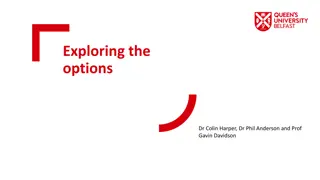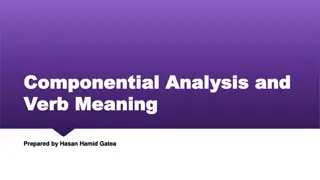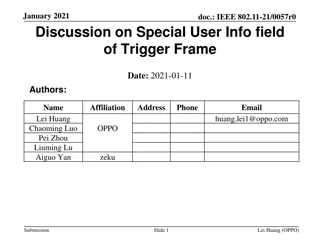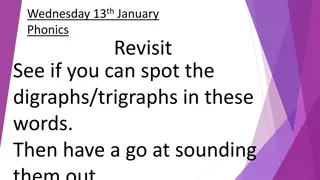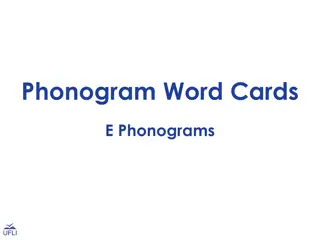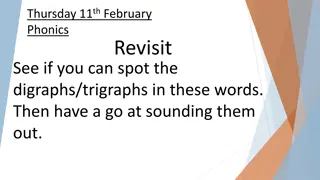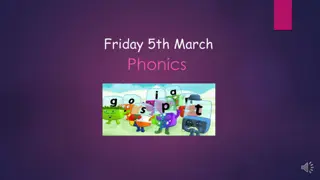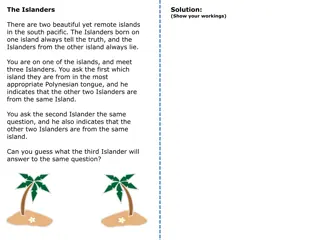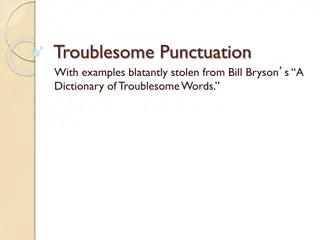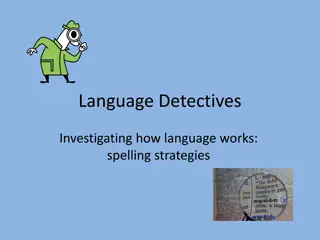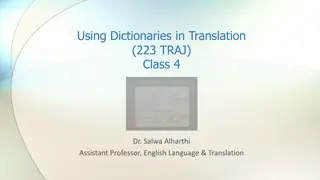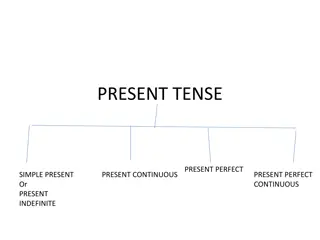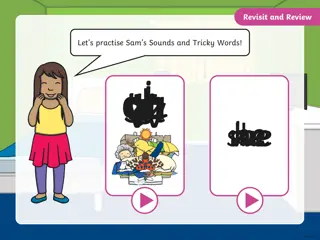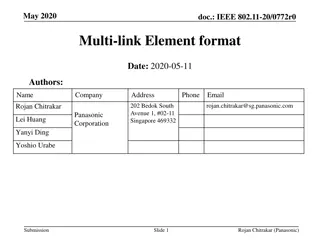Tricky Word Usages and Distinctions Explained
Explore the nuances of tricky word usages such as all ready vs. already, all together vs. altogether, allude vs. elude, alternately vs. alternatively, amoral vs. immoral, angry at vs. angry with, and ante- vs. anti-. Understand the subtle differences in these word pairs to enhance your language skills and avoid confusion.
Download Presentation

Please find below an Image/Link to download the presentation.
The content on the website is provided AS IS for your information and personal use only. It may not be sold, licensed, or shared on other websites without obtaining consent from the author. Download presentation by click this link. If you encounter any issues during the download, it is possible that the publisher has removed the file from their server.
E N D
Presentation Transcript
20 Tricky Word Usages It is of interest to note that while some dolphins are reported to have learned English -- up to fifty words used in correct context -- no human being has been reported to have learned dolphinese. ~Carl Sagan (1934 - 1996)
all ready vs. already all ready pronoun (all) + adjective modifier (ready) They were all ready to go dancing. already an adverb denoting time The pie was already baked.
all together vs. altogether all together gathered in a group The Write Place staff were all together suffering through another PowerPoint. Altogether adverb meaning completely The PowerPoint presentation was altogether mind-numbing.
allude vs. elude allude make a quick reference to In demonstrating the Write Place culture, he alluded to the finger puppets in the Bistro. Elude to evade or avoid I eluded Carol by hiding in the bathroom, said Jake.
alternately vs. alternatively alternately adverb denoting time, meaning by turns When making mayonnaise, add oil and lemon juice alternately. Alternatively adverb denoting by way of an alternative You can create a handout or, alternatively, you can wash the coffee cups.
amoral vs. immoral amoral an amoral person, action, or thing is one for which the whole concept of morality is foreign or irrelevant The sociopathic murderer is amoral. OR A devastating hurricane is amoral. immoral doesn t measure up to cultural standards of morality Unmarried women who had children used to be thought of as immoral. Or Cutting down the 200 year-old oak in the center of town is an immoral action.
angry at vs angry with angry at pertains to situations I am angry at the way I was treated at the Dept. of Public Safety. angry with pertains to people I am angry with my younger sister for plagiarizing my paper.
ante- vs. anti- ante before An antecedent is the noun which comes before the pronoun that represents it. For example; John had better put the beer back in the cooler, if he wants it to stay cold. anti against, contrary to I use anti-freeze in my car in the winter.
ascent vs. assent ascent climb It was a steep ascent to the top of Enger Tower Assent agree or agreement (either verb or noun) She will assent to re-funding the Write Place OR She gave her assent when asked to re- fund the Write Place.
censor vs. censure censor to cut out or prevent something offensive from appearing The government censored parts of the soldiers letters to keep information about military action out of the hands of the enemy. censure to condemn The Governor was censured for using public funds to help build his vacation home.
complacent vs. complaisant vs. compliant complacent self-satisfied His complacency in the middle of the mess he created caused him to be defeated in the last election. complaisant doing what one can to please others Chris was consistently complaisant in his dealings with clients at the reception desk. compliant doing what your are told whether it pleases you or not She was compliant when asked to re-do the report, even though she fumed inside.
continual vs. continuous continual keeps coming back, keeps repeating I get so frustrated at the continual auto-format generated typos in my Facebook posts. continuous never goes away, goes on and on Interstate90 is a continuous, straight and boring route across South Dakota, rarely broken by a hill or curve.
differ from vs. differ with differ from to be different from The last tutorial greatly differed from this one. differ with to disagree I differed with my father over the value of his old Ford Fairlane.
discreet vs. discrete discreet to be tactful and to keep secrets Julie was discreet when her roommate s boss called to ask why she didn t come to work. Discrete - to be separate from Linguistics and rhetoric are discrete disciplines.
disinterested vs. uninterested disinterested impartial, no vested interest She was a disinterested observer, which made her analysis credible. Uninterested not interested The client acted as though he was uninterested in his own essay.
farther vs. further farther used when referring to physical space It is farther to Las Vegas than to Missoula. further other non-physical distance I want you to take that argument further. Push the envelope.
flaunt vs. flout flaunt to make a show of He flaunted his wealth by parking his Lamborghini right in front of the Write Place. Flout to scoff at or mock The students flout the noise ordinance on the south side every weekend.
incredible vs. incredulous incredible unbelievable, fantastic The Minnesota Lynx have been incredible this season. incredulous unbelieving, doubting When I told her I d never had a speeding ticket, she looked at me incredulously.
ingenious vs. ingenuous ingenious clever, inventive Toni Morrison s plot lines are ingenious as well as meticulously crafted. ingenuous innocent Even though he was guilty as sin, his ingenuous expression convinced others he had nothing to do with the mess.
temerity vs. timidity temerity foolhardy boldness or chance- taking His temerity was once again demonstrated when he dove off the cliff without checking to see how deep the water was. timidity fearfully cautious The great Dane s timidity when faced with the aggressive toy poodle was hysterically funny.
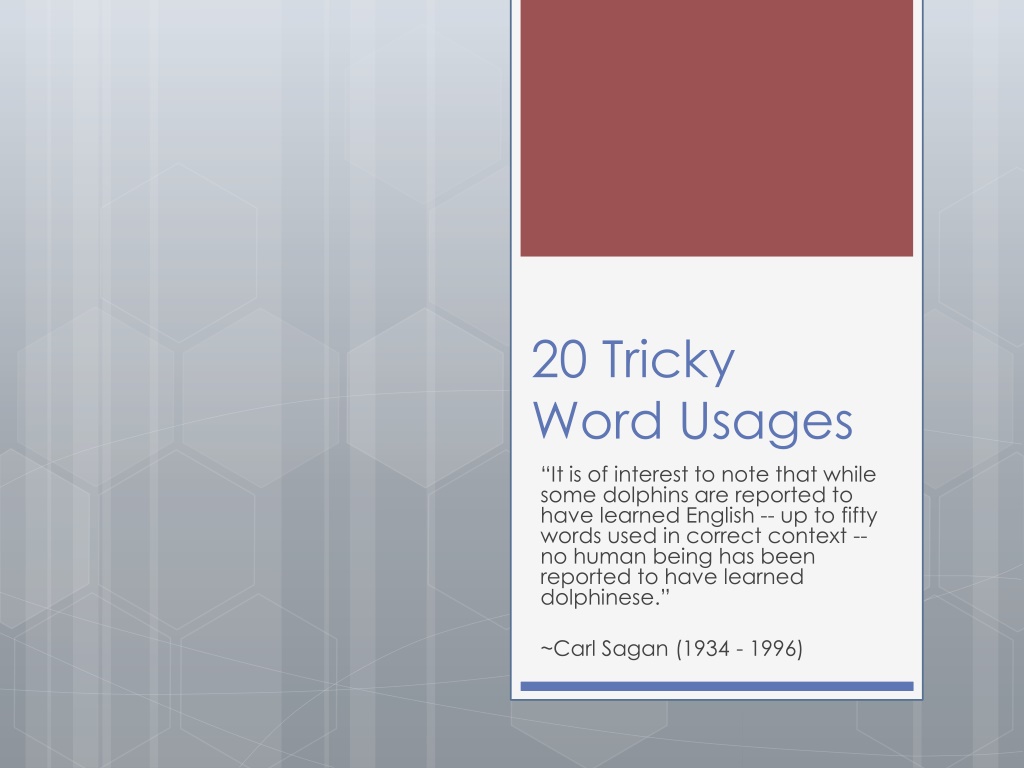
 undefined
undefined










